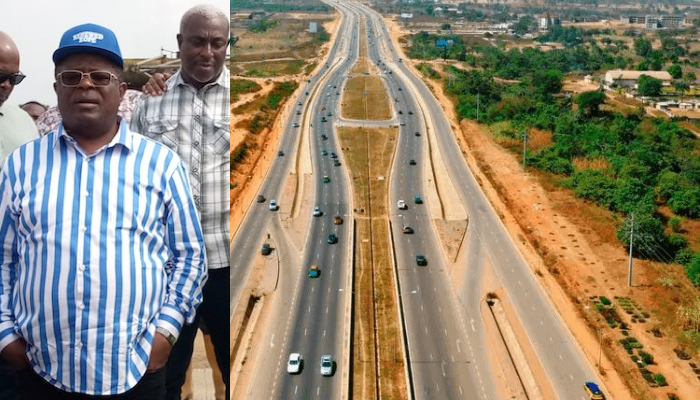
Amid ongoing court cases filed by disgruntled individuals, the Federal Government remains committed to the construction of the 700km Lagos-Calabar Coastal Highway.
Addressing procurement process concerns that led to legal proceedings by landowners, the Minister of Works, David Umahi, emphasized that the N15.36tn coastal highway project, set to be constructed with concrete pavement, underwent all requisite legal and procedural processes before commencing.
Since construction began in March 2024, the coastal highway has been met with public scrutiny and controversies.
In May, Umahi revealed that 750 houses along the highway path were earmarked for demolition.
However, property owners affected by the demolitions expressed dissatisfaction with the government’s compensation, deeming it inadequate compared to their investments.
Some stakeholders and experts criticized the road procurement process, highlighting alleged lack of transparency in awarding the construction contract and circumvention of proper procurement procedures.
Stretching from Lagos to Cross River, the project traverses through coastal states, playing a critical role in enhancing connectivity and stimulating economic activities in Nigeria’s coastal region.
The project, estimated to cost N4bn per kilometer, has seen contracts awarded for two sections totaling N2.46tn, each less than 100km in length.
Umahi projected an eight-year timeline for project completion, although delays could potentially impact delivery schedules and escalate costs.
During a press briefing marking his first year in office, Umahi reaffirmed the government’s resolve to see the project to completion, affirming adherence to all legal and procedural prerequisites.
Dismissing allegations of improper authorization for the project, Umahi emphasized the project’s approval by the Federal Executive Council under the Restrictive Procurement Act.
In defense of the project’s cost, Umahi contested comparisons to international projects, arguing against oversimplification of cost analysis without comprehensive understanding.
Umahi assured completion of all environmental and social impact assessments, noting the project’s inclusion in the 2023 supplementary appropriation.
Despite legal challenges, Umahi remained resolute, warning against attempts to thwart the project’s progress through litigation.
Additionally, he outlined measures to ensure cost efficiency in government projects, introducing new protocols for project oversight and community engagement.
Acknowledging funding constraints, Umahi remained optimistic and introduced a Public-Private Partnership scheme for the highway’s second phase development.
The tolling of Nigerian roads has been approved by the Infrastructure Concession Regulatory Commission.
Effective collaboration among federal, state, and local governments, along with the private sector, is essential for the successful implementation of these new policies as emphasized by Umahi.
Umahi commended President Tinubu’s road sector agenda, stating that it holds the promise of transforming Nigeria’s infrastructure, boosting economic growth, and enhancing the quality of life for citizens.
The minister outlined the government’s focus on completing four key projects by 2025, with plans for them to be commissioned by the President.
Umahi stressed the importance of allocating significant budgetary resources to ensure the timely completion and commissioning of these projects by 2025.
Providing an update, the minister disclosed that the total value of ongoing projects as of May 2023 stood at N14.42tn.
He further revealed that N4.7tn had been certified, N3.12tn disbursed, and N1.61tn remained outstanding to contractors for certified works.
There is a funding shortfall of about N13tn for the completion of all inherited projects, with projections indicating it could exceed N16tn in line with current market conditions.
Acknowledging the economic rationale behind the removal of fuel subsidies and naira floatation, Umahi emphasized the need to align project budgets with prevailing market realities, given the prolonged durations of some projects.
Reflecting on his ministry’s achievements over the past year, Umahi highlighted the allocation of N300bn in the 2023 Supplementary Budget, with around 90% of the projects successfully executed.
The 2023 Supplementary Budget allocated N300bn for ongoing and new emergency projects under the Federal Ministry of Works, with N4.73tn certified, N3.1tn disbursed, and N1.61tn owed to contractors for certified works.
“The current administration inherited a total of 18,932.50km of ongoing projects encompassing 2,064 contracts, with a collective value of N14.42tn as of May 2023.”
